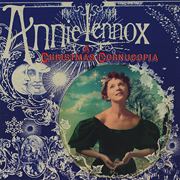
A Christmas Cornucopia
Annie Lennox
2010: Decca/Universal Island Records B0014992-02
Those who know me as a long-time Eurythmics fan and largely an Annie Lennox fan as well might be surprised to know that I was in no rush to get a copy of this album for myself. But when I first heard of it and its November 2010 release, I winced a little…and when I heard a couple of samples of its content, that reaction became a full-blown cringe. Just before Christmas I finally got to hear the whole thing through and decide for myself what its quality was, before wrapping and shipping a copy as a gift, and I’m sad to say my first impressions were correct.
When the CD was being hyped ahead of its release, I noted that the reviews were entirely too gushing and reverent regarding Lennox, so when I saw one review that bluntly said Ouch, I was downright relieved. I’d felt it was all too much like “The Emperor’s New Clothes” from my own perspective to NOT be felt and expressed elsewhere eventually. Especially the one “original” composition she included on the CD, “Universal Child,” which when I first heard an early sample online immediately made me think “shit, this is just ‘Shining Light’ ” (the Ash song Lennox covered in 2009, which was nice but not much different from the original except insofar as it had Lennox’s multitracked vocals adding a certain radiant beauty) “slower and with different lyrics.”
The album’s not good, as a whole, although it does have numerous good aspects…they just don’t combine so much as they mitigate the rest. Overall, Lennox is just singing far too much at full-blast level and waaaaaay too high in her vocal range. “Il est né le divin enfant” is practically *centered* on the spot where her voice breaks, and it was almost unlistenable for me. On some other tracks she does keep things down where she can be so much more effective, but clearly she didn’t have non-sycophantic companions around her saying “ooooh, ouch honey, take it down at least a fifth and ease up on the bombast.” Which would have helped this a lot.
One reason I wasn’t eager to get ahold of this, or even to listen to it, was that she had the African Children’s Choir on many tracks. I dislike children’s voices in pretty much all contexts, and the only choral performances I like are Le Mystère des Voix Bulgares and such, so that was a bad sign for me; coupled with Lennox’s song “Universal Child,” all about the cherished value of children, it was like a Mr Yuk sticker. (I don’t share such adoration-of-children, every-life-is-sacred sentiments and cannot connect with them in this already overpopulated world.)
Having said all that, I can note with some relief that it’s not utter dross and that much of the album is very interesting; there are even occasional moments of shining glory. (Well, “near-glory” anyway.) Her rendition of “Lullay Lullay (Coventry Carol)” is unquestionably the most breathtaking version of it I’ve ever heard, as it delivers the lyrics not in their usual pious-and-sonorous form but rather full-on face value as angry grieving reaction to immediate infanticide. THAT one for sure grabbed me, and it fulfilled Lennox’s wish that the listener would hear these songs as if for the first time.
I can also place some of the blame for the disappointing showing on the fact that these are essentially hymns—rather trite structures with often stilted lyrics and forced rhyme schemes—rather than original songs, or even covers of original songs, such as Lennox is much better suited to because her choice of songs more typically lends itself to interpretive breadth. “O Little Town of Bethlehem” is a great example of the mismatch of material to artistry: the version she sings here uses the English hymn melody best known in the U.K., whereas even the version best known in the U.S. would have served her better, as it’s far less hymnlike and provides a more expressive and nuanced melody for vocal interpretation than the clomping 4/4 structure of the former, which would easily have its lyrics replaced by any number of other hymns.
Comments © 2010/2014 Mark Ellis Walker, except as noted, and no claim is made to the images and quoted lyrics.